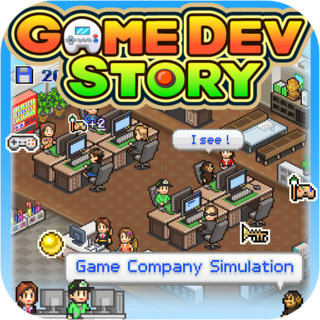Game Dev Story Review By Steven Turner
Publisher: Kairosoft
Developer: Kairosoft
Genre: Simulation
Format: iPhone and Android
Release Date: October 13th(iPhone), December 11th (Android)
Price: £1.79 iPhone, £3.01-Android
Kairosoft have managed to make a game in which you can make a game about making games. Presumably then in one of those games you could also make a game about making games, but lets not get into a hypothetical infinite Russian doll type scenario…
As the title suggests, in Game Dev story you play a video games developer: aiming to create hit games and become top dog in the industry. You play as the CEO of your fledgling development company who are about to open business aided only by your trusty secretary and half a million dollars in the bank. The game takes on a simulation format and gives you a top down view of your office as you micro manage your way to success.
Although this game is developer/publisher Kairosoft's first venture into the western market, they have been producing simulation games for Japenese PC and their mobile phone market for nearly fifteen years. Clearly they have simulation pedigree (which sounds like an interactive dog food game, but I digress...). They have also recently completed the android port of the game, which is more expensive, but still worth every penny.
It's your lovely pixilated secretary who introduces you into the game; acting as a tutorial guide and a source of notifications throughout the game. Then it's straight to business. You must hire staff and either take a video game related contract from another company or begin on your own production. The contracts you can take range from providing music for a game or producing mini games for a website. They may be linear but keep your staff busy and provide both a quick injection of cash and of the game's other currency: research points. These points can then be spent on levelling up staff, which increases their four base attributes: programming, scenario, graphics and sound. It is these attributes that contribute to how useful your member of staff is at a certain stage of producing a game. Programming helps coding, scenario helps writing a game proposal, graphics help the games appearance and sound helps the game soundtrack. All of these factors then add up to determine whether your game will be good or not.
As in the real world though, a good game is not always a successful one. Your company will develop a fan base made up of gamers of certain ages and gender which, along with whether your games genre and direction fit and whether your game is well advertised, will determine if it sells. The complexity adds to a feel that you really have control over what is happening. Even though the decisions you can make may be linear, the options available and the inventiveness with which they are employed make for simple but addictive gameplay.
There is also a welcome dash of humour thrown into the mix. You'll find your hiring staff called Gilly Bates and Holly Cow, along with producing games for the Sonny Playstatus and battling for awards with the Intendro company. The only worry is that you find yourself laughing at these silly names because the general gameplay has begun to become slightly repetitive.
Repetitiveness however is often related to simplicity and approachability, which are the mainstay of the mobile market (and also happen to be two of the positive attributes of the games you make in the Game Dev story.) The slight repetitive nature of the gameplay is only a minor fault and even though the game stops recording your high score after twenty gameplay years; you will find yourself continuing for long after.
The wealth of features and the rewarding gameplay pull the game out of any minor cycle of monotony and make it one of the most interesting iPhone/android games to date. The game is inventive, humorous and thoroughly enjoyable as well as having the legs to last many a bus journey. You'll never need another game about making games again…although the imaginary gamers in Game Dev Story might: so I suggest you go make them one.
By Steven Turner

